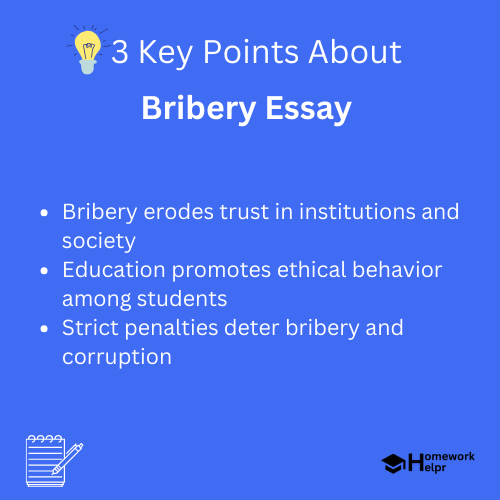📝 Summary
Bribery is a serious issue impacting individuals, societies, and governments globally. It involves the act of offering, giving, receiving, or soliciting something of value to influence someone in authority. This unethical practice leads to a loss of integrity, fairness, and trust. Forms of bribery include direct payments, indirect favors, and commercial or political corruption. Preventing bribery requires a united effort through education, transparency, and strict penalties. Ultimately, promoting ethical behavior and understanding the consequences of bribery is vital for cultivating a society that values integrity and discourages corruption.
Understanding Bribery: An Essay for Students
Bribery is a significant issue that affects individuals, societies, and governments around the world. It refers to the act of offering, giving, receiving, or soliciting something of value to influence the actions of an official or another person in a position of authority. This article will delve into the various aspects of bribery, its consequences, prevention methods, and ways to encourage ethical behavior among students.
What is Bribery?
At its core, bribery involves a corrupt exchange. For example, it could involve a company paying a government official to win a contract. This unethical act skews fairness and compromises integrity across various sectors. In addition, bribery is not limited to only monetary exchanges; it can also include gifts, favors, or services rendered in exchange for influence.
Definition
Corruption: Dishonest or unethical conduct often by those in power, typically involving bribery.
Integrity: The quality of being honest and having strong moral principles.
Examples
For instance, a teacher accepting gifts from students in exchange for better grades can be considered bribery.
Examples
A police officer who overlooks a traffic violation after receiving money as a bribe is another example.
The Forms of Bribery
Bribery can take many forms, including direct payments or more indirect exchanges such as favors. Understanding these forms is crucial. Here are some common types of bribery:
- Direct Bribery: This involves straightforward exchanges, such as cash payments.
- Indirect Bribery: This refers to non-monetary gifts or favors, like a luxury vacation offered to a key decision-maker.
- Commercial Bribery: This happens in the business environment, where a company may bribe employees of a competitor.
- Political Bribery: Involves paying government officials to gain political favors or decisions.
Recognizing these forms can help students and young people understand the implications and ethical dilemmas surrounding bribery.
Consequences of Bribery
Bribery has numerous far-reaching consequences. One of the most notable impacts is the erosion of trust in institutions and individuals. When bribery occurs, it can lead to:
- Loss of Credibility: Organizations involved in bribery can lose their reputation.
- Economic Impact: Bribery can stifle competition and innovation.
- Social Inequality: It can lead to unfair advantages and widen the gap between rich and poor.
- Legal Repercussions: Engaging in bribery can lead to severe legal consequences, both civil and criminal.
Definition
Institutional Trust: The confidence that individuals have in the systems and organizations designed to serve society.
Reputation: The beliefs or opinions that are generally held about someone or something.
Examples
A company that is discovered to have engaged in bribery may face legal penalties and be banned from participating in government contracts.
Examples
When citizens lose trust in their government due to corruption, social unrest may occur, further destabilizing society.
Prevention Strategies Against Bribery
Preventing bribery requires a coordinated effort from all sectors of society. Here are some strategies that can be employed:
- Education: Teaching students about ethics and integrity in schools can cultivate a new generation of individuals who refuse to engage in corrupt practices.
- Transparency: Governments and organizations should encourage open practices that make it harder for bribery to occur.
- Whistleblower Protections: Safeguarding individuals attempting to report corrupt acts can deter potential offenders.
- Strict Penalties: Enforcing strict legal consequences for those involved in bribery can serve as a deterrent.
❓Did You Know?
Did you know that in ancient Rome, bribery was so common that they had specific laws against it, stating that active political campaigns were most rife with corruption?
Encouraging Ethical Behavior Among Students
Promoting ethical behavior in schools is vital for combating bribery and corruption in the long term. Schools can implement programs that teach about the importance of integrity and ethical decision-making. Here are some methods:
- Workshops: Facilitate discussions and workshops that focus on ethical dilemmas students may face.
- Role-playing: Engage students in role-playing exercises that depict various scenarios involving bribery and its consequences.
- Acknowledge Integrity: Celebrate students who display strong ethical behavior to motivate others.
By implementing such programs, schools can play a crucial role in fostering moral values and creating an environment resistant to bribery.
Conclusion
Bribery remains a challenge globally, affecting various aspects of life, from economics to governance. Through understanding its forms, consequences, and prevention strategies, students can become informed and ethical citizens. Cultivating a culture of integrity and ethical behavior will require commitment from educational institutions, governments, and individuals alike. It is essential that we work together to create a society where integrity is valued, and bribery has no place.

Related Questions on Bribery Essay for Students and Children
What is bribery?
Answer: Bribery involves corrupt exchanges for influence.
What are the consequences of bribery?
Answer: It leads to loss of credibility and legal issues.
How can bribery be prevented?
Answer: Education, transparency, and strict penalties help prevent bribery.
Why is integrity important?
Answer: Integrity fosters trust and ethical behavior in society.
